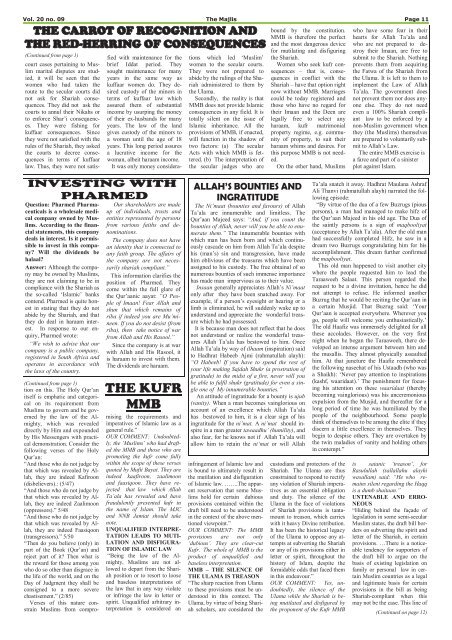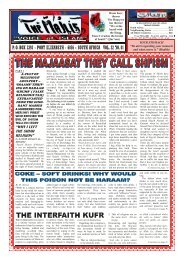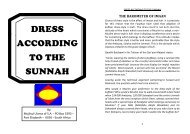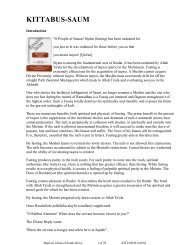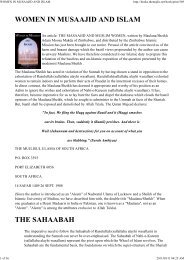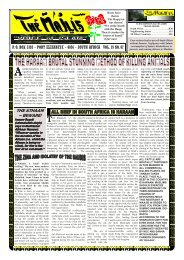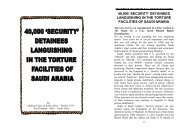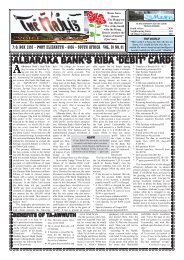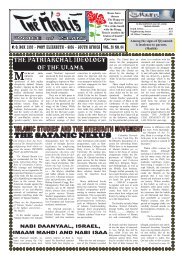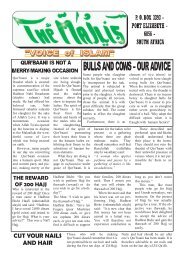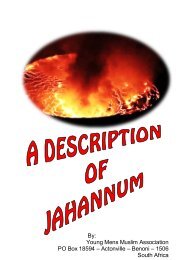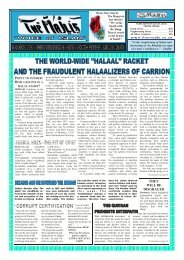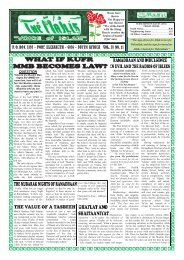MAJLIS VOL 20 NO 09.pub - The Majlis
MAJLIS VOL 20 NO 09.pub - The Majlis
MAJLIS VOL 20 NO 09.pub - The Majlis
Create successful ePaper yourself
Turn your PDF publications into a flip-book with our unique Google optimized e-Paper software.
Vol. <strong>20</strong> no. 09 <strong>The</strong> <strong>Majlis</strong><br />
Page 11<br />
(Continued from page 1)<br />
court cases pertaining to Muslim<br />
marital disputes are studied,<br />
it will be seen that the<br />
women who had taken the<br />
route to the secular courts did<br />
not ask for Shariah consequences.<br />
<strong>The</strong>y did not ask the<br />
courts to annul their Nikahs or<br />
to enforce Shar’i consequences.<br />
<strong>The</strong>y were fishing for<br />
kuffaar consequences. Since<br />
they were not satisfied with the<br />
rules of the Shariah, they asked<br />
the courts to decree consequences<br />
in terms of kuffaar<br />
law. Thus, they were not satisfied<br />
with maintenance for the<br />
brief Iddat period. <strong>The</strong>y<br />
sought maintenance for many<br />
years in the same way as<br />
kuffaar women do. <strong>The</strong>y desired<br />
custody of the minors in<br />
terms of kuffaar law which<br />
assured them of substantial<br />
income by usurping the money<br />
of their ex-husbands for many<br />
years. <strong>The</strong> law of the land<br />
gives custody of the minors to<br />
a woman until the age of 18<br />
years. This long period assures<br />
a lucrative income for the<br />
woman, albeit haraam income.<br />
It was only money considerations<br />
which led ‘Muslim’<br />
women to the secular courts.<br />
<strong>The</strong>y were not prepared to<br />
abide by the rulings of the Shariah<br />
administered to them by<br />
the Ulama.<br />
Secondly, the reality is that<br />
MMB does not provide Islamic<br />
consequences in any field. It is<br />
totally silent on the issue of<br />
Islamic inheritance. All the<br />
provisions of MMB, if enacted,<br />
will function in the shadow of<br />
two factors: (a) <strong>The</strong> secular<br />
Acts with which MMB is fettered.<br />
(b) <strong>The</strong> interpretation of<br />
the secular judges who are<br />
bound by the constitution.<br />
MMB is therefore the perfect<br />
and the most dangerous device<br />
for mutilating and disfiguring<br />
the Shariah.<br />
Women who seek kufr consequences<br />
– that is, consequences<br />
in conflict with the<br />
Shariah – have that option right<br />
now without MMB. Marriages<br />
could be today registered and<br />
those who have no regard for<br />
their Imaan and the Deen are<br />
legally free to select any<br />
haraam, kufr matrimonial<br />
property regime, e.g. community<br />
of property, to suit their<br />
haraam whims and desires. For<br />
this purpose MMB is not needed.<br />
On the other hand, Muslims<br />
who have some fear in their<br />
hearts for Allah Ta’ala and<br />
who are not prepared to destroy<br />
their Imaan, are free to<br />
submit to the Shariah. Nothing<br />
prevents them from acquiring<br />
the Fatwa of the Shariah from<br />
the Ulama. It is left to them to<br />
implement the Law of Allah<br />
Ta’ala. <strong>The</strong> government does<br />
not prevent them nor does anyone<br />
else. <strong>The</strong>y do not need<br />
even a 100% Shariah compliant<br />
law to be enforced by a<br />
non-Muslim government when<br />
they (the Muslims) themselves<br />
are prepared to voluntarily submit<br />
to Allah’s Law.<br />
<strong>The</strong> entire MMB exercise is<br />
a farce and part of a sinister<br />
plot against Islam.<br />
Question: Pharmed Pharmaceuticals<br />
is a wholesale medical<br />
company owned by Muslims.<br />
According to the financial<br />
statements, this company<br />
deals in interest. Is it permissible<br />
to invest in this company?<br />
Will the dividends be<br />
halaal?<br />
Answer: Although the company<br />
may be owned by Muslims,<br />
they are not claiming to be in<br />
compliance with the Shariah as<br />
the so-called ‘Islamic’ banks<br />
contend. Pharmed is quite honest<br />
in stating that they do not<br />
abide by the Shariah, and that<br />
they do deal in haraam interest.<br />
In response to our enquiry,<br />
Pharmed wrote:<br />
“We wish to advise that our<br />
company is a public company,<br />
registered in South Africa and<br />
operates in accordance with<br />
the laws of the country.<br />
Our shareholders are made<br />
up of individuals, trusts and<br />
entities represented by persons<br />
from various faiths and denominations.<br />
<strong>The</strong> company does not have<br />
an identity that is connected to<br />
any faith group. <strong>The</strong> affairs of<br />
the company are not necessarily<br />
shariah compliant.”<br />
This information clarifies the<br />
position of Pharmed. <strong>The</strong>y<br />
come within the full glare of<br />
the Qur’aanic aayat: “O People<br />
of Imaan! Fear Allah and<br />
shun that which remains of<br />
riba if indeed you are Mu’mineen.<br />
If you do not desist (from<br />
riba), then take notice of war<br />
from Allah and His Rasool.”<br />
Since the company is at war<br />
with Allah and His Rasool, it<br />
is haraam to invest with them.<br />
<strong>The</strong> dividends are haraam.<br />
THE KUFR<br />
MMB<br />
(Continued from page 1)<br />
tion on this. <strong>The</strong> Holy Qur’an<br />
itself is emphatic and categorical<br />
on its requirement from<br />
Muslims to govern and be governed<br />
by the law of the Almighty,<br />
which was revealed<br />
directly by Him and expounded<br />
by His Messengers with practical<br />
demonstration. Consider the<br />
following verses of the Holy<br />
Qur’an:<br />
“And those who do not judge by<br />
that which was revealed by Allah,<br />
they are indeed Kafiroon<br />
(disbelievers).: (5/47)<br />
“And those who do not judge by<br />
that which was revealed by Allah,<br />
they are indeed Zaalimoon<br />
(oppressors).” 5/48<br />
“And those who do not judge by<br />
that which was revealed by Allah,<br />
they are indeed Faasiqoon<br />
(transgressors).” 5/50<br />
“<strong>The</strong>n do you believe (only) in<br />
part of the Book (Qur’an) and<br />
reject part of it? <strong>The</strong>n what is<br />
the reward for those among you<br />
who do so other than disgrace in<br />
the life of the world, and on the<br />
Day of Judgment they shall be<br />
consigned to a more severe<br />
chastisement.” (2/85)<br />
Verses of this nature constrain<br />
Muslims from compromising<br />
the requirements and<br />
imperatives of Islamic law as a<br />
general rule.”<br />
OUR COMMENT: Undoubtedly,<br />
the ‘Muslims’ who had drafted<br />
the MMB and those who are<br />
promoting the kufr come fully<br />
within the scope of these verses<br />
quoted by Mufti Bayat. <strong>The</strong>y are<br />
indeed kaafiroon, zaalimoon<br />
and faasiqoon. <strong>The</strong>y have rejected<br />
that law which Allah<br />
Ta’ala has revealed and have<br />
fraudulently presented kufr in<br />
the name of Islam. <strong>The</strong> MJC<br />
and NNB Jamiat should take<br />
note.<br />
UNQUALIFIED INTERPRE-<br />
TATION LEADS TO MUTI-<br />
LATION AND DISFIGURA-<br />
TION OF ISLAMIC LAW<br />
“Being the law of the Almighty,<br />
Muslims are not allowed<br />
to depart from the Shariah<br />
position or to resort to loose<br />
and baseless interpretations of<br />
the law that in any way violate<br />
or infringe the law in letter or<br />
spirit. Unqualified arbitrary interpretation<br />
is considered an<br />
ALLAH’S BOUNTIES AND<br />
INGRATITUDE<br />
<strong>The</strong> Ni’maat (bounties and favours) of Allah<br />
Ta’ala are innumerable and limitless. <strong>The</strong><br />
Qur’aan Majeed says: “And, if you count the<br />
bounties of Allah, never will you be able to enumerate<br />
them.” <strong>The</strong> innumerable bounties with<br />
which man has been born and which continuously<br />
cascade on him from Allah Ta’ala despite<br />
his (man’s) sin and transgression, have made<br />
him oblivious of the treasures which have been<br />
assigned to his custody. <strong>The</strong> free obtainal of so<br />
numerous bounties of such immense importance<br />
has made man impervious as to their value.<br />
Insaan generally appreciates Allah’s Ni’maat<br />
only after they have been snatched away. For<br />
example, if a person’s eyesight or hearing or a<br />
limb is eliminated, he will suddenly wake up to<br />
understand and appreciate the wonderful treasure<br />
which he had possessed.<br />
It is because man does not reflect that he does<br />
not understand or realize the wonderful treasures<br />
Allah Ta’ala has bestowed to him. Once<br />
Allah Ta’ala by way of ilhaam (inspiration) said<br />
to Hadhrat Habeeb Ajmi (rahmatullah alayh):<br />
“O Habeeb! If you have to spend the rest of<br />
your life making Sajdah Shukr (a prostration of<br />
gratitude) in the midst of a fire, never will you<br />
be able to fulfil shukr (gratitude) for even a single<br />
one of My innumerable bounties.”<br />
An attitude of ingratitude for a bounty is ujub<br />
(vanity). When a man becomes vainglorious on<br />
account of an excellence which Allah Ta’ala<br />
has bestowed to him, it is a clear sign of his<br />
ingratitude for the ni’mat. A ni’mat should inspire<br />
in a man greater tawaadhu’ (humility), and<br />
also fear, for he knows not if Allah Ta’ala will<br />
allow him to retain the ni’mat or will Allah<br />
infringement of Islamic law and<br />
is bound to ultimately result in<br />
the mutilation and disfiguration<br />
of Islamic law. …….<strong>The</strong> apparent<br />
reservation that some Muslims<br />
hold for certain dubious<br />
provisions contained within the<br />
draft bill need to be understood<br />
in the context of the above mentioned<br />
viewpoint.”<br />
OUR COMMENT: <strong>The</strong> MMB<br />
provisions are not only<br />
‘dubious’. <strong>The</strong>y are clear-cut<br />
Kufr. <strong>The</strong> whole of MMB is the<br />
product of unqualified and<br />
baseless interpretation.<br />
MMB – THE SILENCE OF<br />
THE ULAMA IS TREASON<br />
“<strong>The</strong> sharp reaction from Ulama<br />
to these provisions must be understood<br />
in this context. <strong>The</strong><br />
Ulama, by virtue of being Shariah<br />
scholars, are considered the<br />
custodians and protectors of the<br />
Shariah. <strong>The</strong> Ulama are thus<br />
constrained to respond to rectify<br />
any violation of Shariah imperatives<br />
as an essential obligation<br />
and duty. <strong>The</strong> silence of the<br />
Ulama in the face of violations<br />
of Shariah provisions is tantamount<br />
to treason, which carries<br />
with it heavy Divine retribution.<br />
It has been the historical legacy<br />
of the Ulama to oppose any attempts<br />
at subverting the Shariah<br />
or any of its provisions either in<br />
letter or spirit, throughout the<br />
history of Islam, despite the<br />
formidable odds that faced them<br />
in this endeavour.”<br />
OUR COMMENT: Yes, undoubtedly,<br />
the silence of the<br />
Ulama while the Shariah is being<br />
mutilated and disfigured by<br />
the proponent of the Kufr MMB<br />
Ta’ala snatch it away. Hadhrat Maulana Ashraf<br />
Ali Thanvi (rahmatullah alayh) narrated the following<br />
episode:<br />
“By virtue of the dua of a few Buzrugs (pious<br />
persons), a man had managed to make hifz of<br />
the Qur’aan Majeed in his old age. <strong>The</strong> Dua of<br />
the saintly persons is a sign of maqbooliyat<br />
(acceptance by Allah Ta’ala). After the old man<br />
had successfully completed Hifz, he saw in a<br />
dream two Buzrugs congratulating him for his<br />
accomplishment. This dream further confirmed<br />
the maqbooliyat.<br />
This old man happened to visit another city<br />
where the people requested him to lead the<br />
Taraaweeh Salaat. This person regarded the<br />
request to be a divine invitation, hence he did<br />
not attempt to refuse. He informed another<br />
Buzrug that he would be reciting the Qur’aan in<br />
a certain Musjid. That Buzrug said: ‘Your<br />
Qur’aan is accepted everywhere. Wherever you<br />
go, people will welcome you enthusiastically.’<br />
<strong>The</strong> old Haafiz was immensely delighted for all<br />
these accolades. However, on the very first<br />
night when he began the Taraaweeh, there developed<br />
an intense argument between him and<br />
the musallis. <strong>The</strong>y almost physically assaulted<br />
him. At that juncture the Haafiz remembered<br />
the following naseehat of his Ustaadh (who was<br />
a Shaikh): ‘Never pay attention to inspirations<br />
(kashf, waaridaat).’ <strong>The</strong> punishment for focusing<br />
his attention on these waaridaat (thereby<br />
becoming vainglorious) was his unceremonious<br />
expulsion from the Musjid, and thereafter for a<br />
long period of time he was humiliated by the<br />
people of the neighbourhood. Some people<br />
think of themselves to be among the elite if they<br />
discern a little excellence in themselves. <strong>The</strong>y<br />
begin to despise others. <strong>The</strong>y are overtaken by<br />
the twin maladies of vanity and holding others<br />
in contempt.”<br />
is satanic ‘treason’, for<br />
Rasulullah (sallallahu alayhi<br />
wasallam) said: “He who remains<br />
silent regarding the Haqq<br />
is a dumb shaitaan.”<br />
UNTENABLE AND ERRO-<br />
NEOUS<br />
“Hiding behind the façade of<br />
legislation in some semi-secular<br />
Muslim states, the draft bill borders<br />
on subverting the spirit and<br />
letter of the Shariah, in certain<br />
provisions. …<strong>The</strong>re is a noticeable<br />
tendency for supporters of<br />
the draft bill to argue on the<br />
basis of existing legislation on<br />
family or personal law in certain<br />
Muslim countries as a legal<br />
and legitimate basis for certain<br />
provisions in the bill as being<br />
Shariah-compliant when this<br />
may not be the case. This line of<br />
(Continued on page 12)


